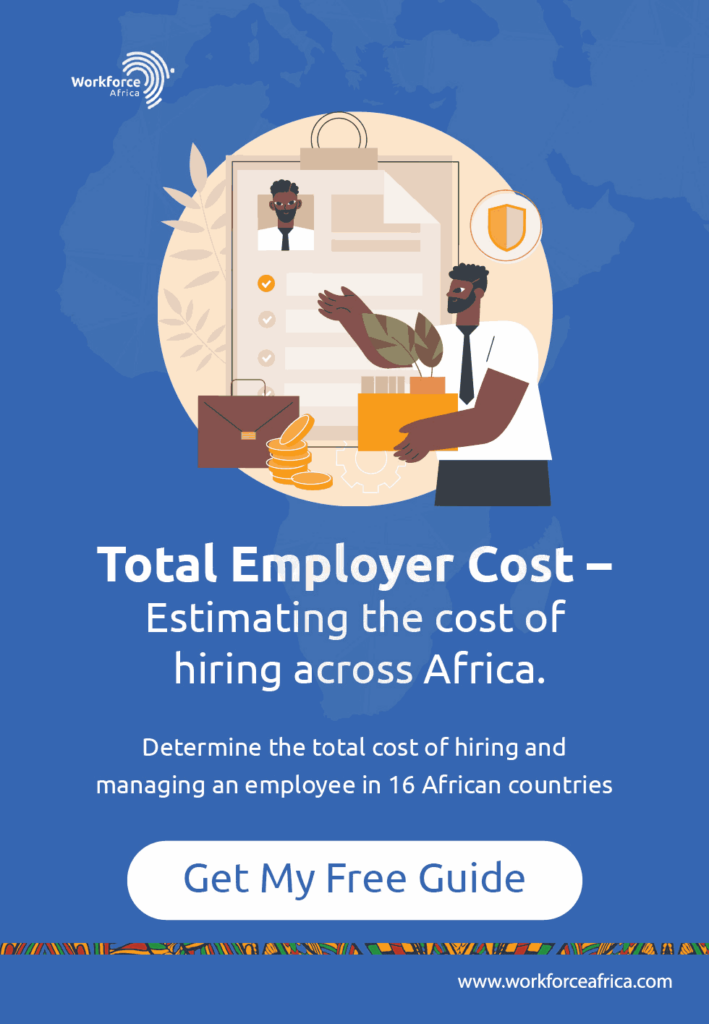
This Customer Service Week, we celebrate you — our clients. Your trust, feedback, and partnership drive everything we do. Thank you for being at the core of our mission.

The offshoring business is a trend that unlocks a diverse pool of skilled professionals to work cost-effectively beyond borders for global businesses.
This article explores how local offshoring companies in Africa create more inclusive ecosystems by connecting global businesses to talent seeking international opportunities.
In today's rapidly globalising business landscape, companies are constantly seeking innovative strategies to gain a competitive edge.
One such strategy that has gained significant traction is the practice of offshoring, which involves outsourcing certain business functions or processes to offshore locations.
While traditional offshoring models have primarily focused on cost-effective labour markets in Asia and Eastern Europe, a new paradigm is emerging.
Leveraging the vast talent pool in Africa through local offshoring companies that provide affordable and skilled talent beyond traditional borders.
By bridging geographical gaps and fostering cultural understanding, these local offshoring companies are instrumental in creating inclusive workplaces that celebrate diversity and empower individuals from diverse backgrounds.
This article explains how local offshoring companies in Africa emerging African market promote diversity, equity, and inclusion by connecting businesses to the skilled and affordable workforce in Africa.
Africa, a continent rich in cultural diversity and human resources, has long been overlooked as a potential hub for global talent sourcing.
However, recent years have witnessed a remarkable transformation, with African nations experiencing rapid economic growth, technological advancements, and a burgeoning workforce with valuable skills and expertise.
According to the African Development Bank, Africa's working-age population is set to expand by a staggering 450 million people, or nearly 70%, by 2035.
This demographic dividend, coupled with the increasing accessibility of education and training, positions Africa as an emerging hotspot for global talent acquisition, offering businesses a vast pool of skilled professionals.
The traditional job market can often limit opportunities for talented individuals based on geographical location.
Top offshoring companies act as disruptors, breaking down these barriers and fostering a more inclusive workplace landscape for the growing skilled African talent. Here’s how:
Local offshoring companies in Africa connect businesses with African talent pools.
This opens doors for skilled professionals on the continent who might need access to similar opportunities in their local markets.
An offshoring company in Africa creates a level playing field for talent by focusing on skills and qualifications over geographical location.
Diverse candidates can compete for roles based on merit, regardless of their local job market limitations.
International hiring can be complex with visa applications, work permits, and tax regulations. Local offshoring companies handle these complexities, allowing diverse talent to focus on their skills and qualifications.
This reduces a significant obstacle that could deter talented individuals in the African landscape from pursuing international opportunities.
Local offshoring companies ensure fair compensation practices. They understand the salary benchmarks in different regions and advocate for competitive wages for the African talent they represent.
This attracts diverse talent that might be undervalued in their local job markets.
Establishing a sense of trust and psychological safety is crucial for fostering inclusivity. Local offshoring companies understand how cultural differences can impact these factors.
They can encourage open communication, provide channels for feedback, and promote collaboration to ensure all team members feel valued and heard.
Local offshoring companies ensure compliance with all relevant African labour laws and regulations across the continent.
This includes an appropriate minimum wage, overtime pay, and social security contributions.
By upholding these standards, offshoring companies protect the rights of employees and contribute to a fair and ethical working environment.
While the potential of Africa's talent pool is undeniable, navigating the complexities of sourcing and managing a remote workforce across multiple African countries can be daunting for global companies.
This is where local offshoring companies in Africa play a pivotal role, serving as trusted partners and facilitators in the offshore outsourcing process.
These local offshoring companies possess deep-rooted knowledge of the African talent landscape, cultural nuances, and regulatory frameworks.
They act as intermediaries, bridging the gap between global businesses and skilled African professionals, enabling a seamless and efficient offshoring experience.
The collaboration between global companies and local African offshoring companies presents a win-win scenario for all stakeholders involved.
This third-party offshore outsourcing model offers many advantages with the roles local offshoring companies play
Access to Diverse Talent Pools
By partnering with local offshoring companies in Africa, global businesses can tap into a rich and diverse talent pool across various sectors, including technology, healthcare, finance, and the creative industries.
This access to a broad range of skills and expertise drives innovation, enhances competitiveness, and fosters a more inclusive workforce.
Cultural Sensitivity and Effective Communication
Local offshoring companies in Africa are well-versed in their respective regions' cultural nuances and communication styles.
They can provide valuable cultural awareness training, facilitate effective communication, and ensure a smooth integration of offshore teams into their clients' organisational culture.
Streamlined Recruitment and Compliance
Navigating the complexities of international recruitment, compliance with local labour laws, and regulatory requirements can be challenging for global businesses.
Local offshoring companies in Africa specialise in these areas, ensuring a seamless and compliant hiring process while adhering to ethical practices and fair labour standards.
Reduced Bias and a Level Playing Field
Partnering with an offshoring company can help reduce unconscious bias.
By focusing on skills and qualifications regardless of location, businesses create a level playing field for talent from diverse backgrounds.
This promotes a culture of meritocracy where individuals are valued for their contributions, fostering a more inclusive work environment.
Cost Optimisation and Increased Efficiency
By leveraging the cost-effective talent pools in Africa, global offshoring firms can optimise costs while maintaining the high-quality standards their clients want from them.
Additionally, local offshoring companies often offer flexible engagement models, allowing businesses to scale their offshore teams up or down based on project demands, contributing to increased efficiency and agility
Fostering Inclusive and Diverse Workplaces
Collaborating with local offshoring companies in Africa aligns with the growing emphasis on diversity, equity, and inclusion (DEI) initiatives within organisations.
By tapping into Africa's diverse talent pool, global offshoring companies help businesses in their markets cultivate a more inclusive and culturally rich workplace, fostering innovation and enhancing their international competitiveness.
Suggested Post: Common Offshoring Mistakes to Avoid When Outsourcing to Africa
While the benefits of partnering with local offshoring companies in Africa are numerous, selecting the right partner is crucial for a successful offshore-outsourcing experience. Here are some key considerations:
Reputation and Track Record
Evaluate the reputation and track record of potential local offshoring companies in Africa.
Look for companies with a proven history of successful collaborations, positive client testimonials, and a commitment to ethical practices and fair labor standards.
Industry Expertise and Talent Pool
Assess the industry expertise and talent pool available through the local offshoring company.
Ensure that they have a strong presence in your specific sector and can provide access to skilled professionals with the required qualifications and experience.
Cultural Alignment and Communication
Consider the cultural alignment and communication capabilities of the local offshoring company.
Effective cross-cultural communication is essential for seamless collaboration and the integration of offshore teams into your organisation.
Compliance and Data Security
Verify the local offshoring company's adherence to relevant compliance standards, data security protocols, and intellectual property protection measures.
This is crucial for safeguarding your business interests and ensuring a secure offshore-outsourcing experience.
Ongoing Support and Scalability
Assess the local offshoring company's ability to provide ongoing support, training, and scalability for your offshore teams.
A reliable partner should be capable of adapting to your evolving business needs and ensuring a consistent level of service and support throughout the engagement.
Suggested Post: 5 Reasons for Outsourcing Back Office Services to Africa
The partnership between global and local offshoring companies in Africa presents a unique opportunity to tap into a vast and diverse talent pool while fostering inclusive and culturally rich workplaces.
By leveraging African offshoring companies' expertise and local knowledge, global businesses can navigate the complexities of offshore outsourcing, optimise costs, and gain a competitive edge in an increasingly globalised market.
As the world continues to recognise the potential of Africa's human resources, this third-party offshore-outsourcing model is poised to become a mutually beneficial force in shaping the future of global talent acquisition.
By embracing this paradigm shift, businesses can unlock new avenues for growth, innovation, and success, while also contributing to the economic development and empowerment of African nations.
At Workforce Africa, we specialise in facilitating seamless offshoring experiences, ensuring fair compensation practices, and fostering a culture of inclusivity for both businesses and talent.